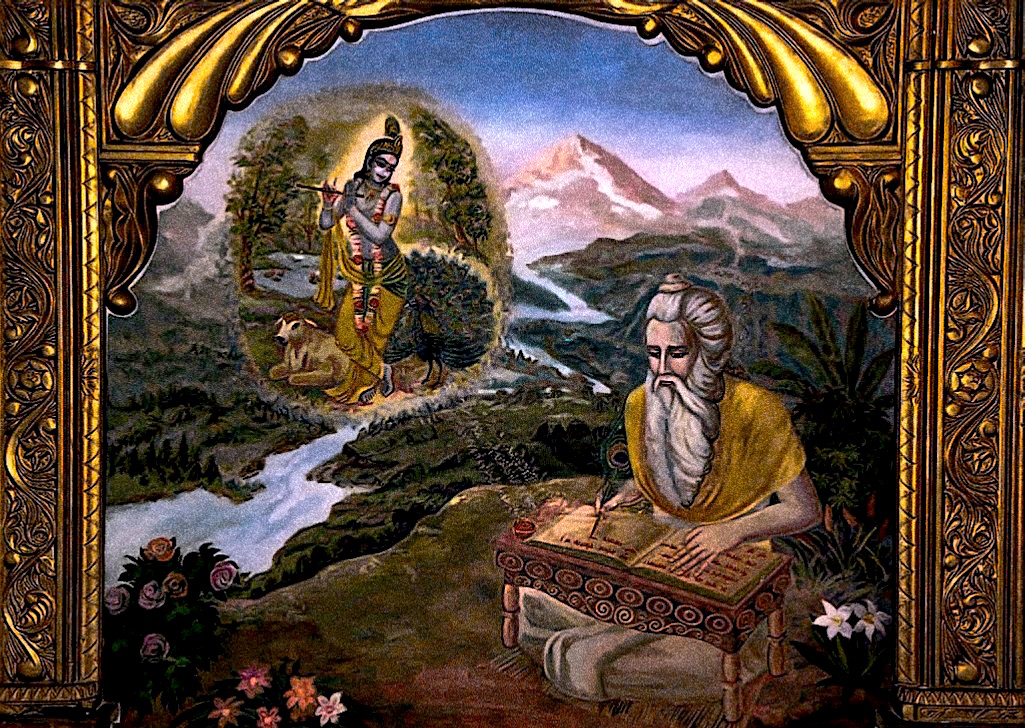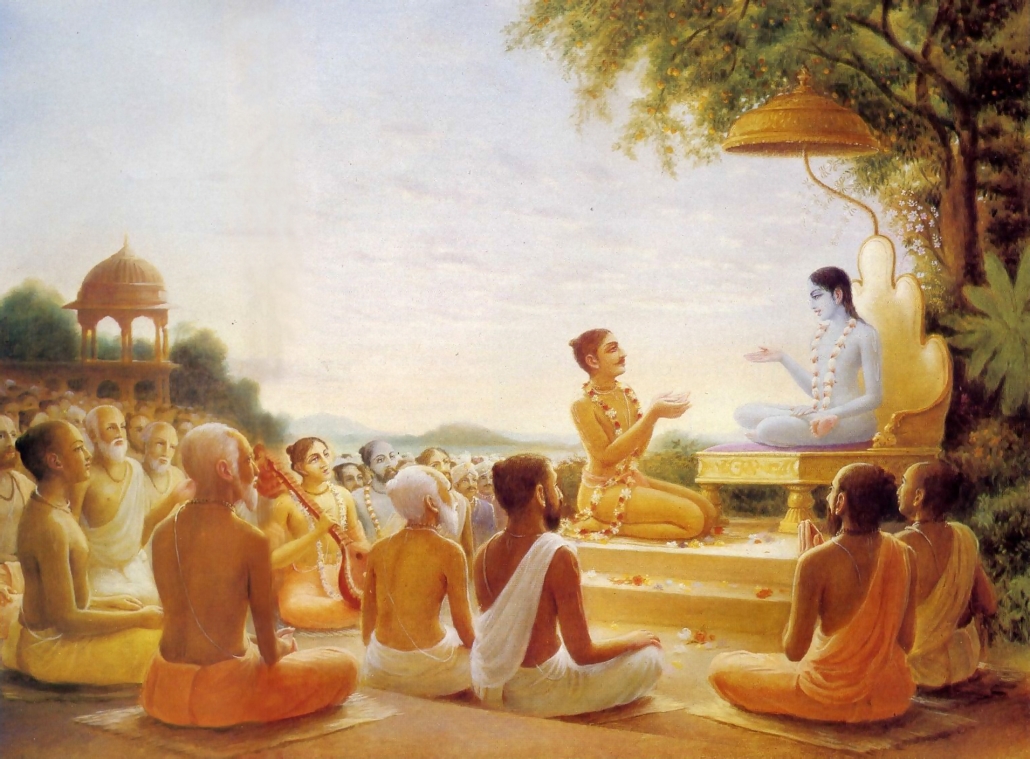Mahanidhi Madan Gopal Das
Srimad Bhagavatam is called the “king of all spiritual books” (Grantha Raja) for good reason. Within this triguna-free, transcendental treatise, the amala-purana, which showcases the absolutely selfless, divine love of Srimati Radharani, one can find all the sweet, majestic and beautiful truths about the sadhana and sadhya (daily practice and perfection) of Gaudiya Vaisnavism.
In his most compassionate and wonderful shastra, Sri Chaitanya Caritamrita, Sri Krishna Dasa Kaviraja summarizes the teachings of Sri Caitanya Mahaprabhu and the six Goswamis of Vrindavana by mentioning the same Bhagavatam verses that they used to substantiate their sublime instructions.
To emphasize the importance of these particular verses for all Gaudiya Vaisnavas, the same Bhagavatam verse is often mentioned two, three or more times in the Sri Chaitanya Caritamrta.
This series of posts presents these verses, along with selected tikas of our acharyas and the compiler. We will cover the beautiful truths, tattvas, of Krishna, Radha, Vaisnavas, Sri Guru, Bhakti Sadhana, Nama, Prema and more.
Srimad Bhagavatam is the Tastiest Fruit of Vedas
nigama-kalpa-taror galitam phalam
shuka-mukhad amrita-drava-samyutam
pibata bhagavatam rasam alayam
muhur aho rasika bhuvi bhavukah
“O refined ones of sensitive taste! O fortunate souls! From the mouth of Shukadeva, constantly drink the Bhagavatam, which is the luscious fruit fallen from the tree of the Vedas. This fruit is immortal liquid, the essence of sweetness and it includes all types of liberation.” (Srimad Bhagavatam 1.1.3)
Sri Visvanatha Cakravartipada tika:
This verse highlights the sweetness of the Bhagavatam. The Vedas (nigama) are a kalpataru (wish-fulfilling tree) because they satisfy humans desires for dharma, artha, kama, and moksha.
Srimad Bhagavatam is called the galitam -phalam, which means fully ripened, sweet fruit. This fruit remains intact and undamaged because it is handed down personally from guru to disciple beginning with Narayana-Brahma-Narada-Vyasa-Shukadeva and so on. This indicates the necessity to drink the rasa (pibita rasam) of Srimad Bhagavatam through guru-parampara and not merely by one’s own intellect.
Alayam: Refers to laya, the eighth sattvika-bhava called pralaya, fainting. One should drink the rasa of Bhagavatam until one faints. And upon returning to consciousness, one will drink more (muhur: continuously) and faint again because one cannot give up drinking. Or it means the more you drink the more you relish. Aho! This is most surprising.
Rasika: This refers only to Krishna bhaktas, who by drinking the Srimad Bhagavatam develop rati (bhava) which becomes their sthayi-rati. Then they can taste the rasa of Bhagavatam.
Bhavukah: refers to persons who perform actions for tasting the beautiful. It indicates persons who appreciate Bhagavan Sri Krishna—who is rasa personified.
The Taittiriya Upanishad (2.7) says, raso -vai –sah, rasam- hy -evayam –labdhanandi -bhavati: Bhagavan Sri Krishna is rasa; by realizing Sri Krishna one attains bliss. Both Gita and Bhagavatam proclaim Krishna to be rasa.
Bhuvi indicates Vraja-bhumi. And bhavukah and rasikah indicate Krishna’s dear gopis. O dear relishers of Krishna rasa, drink the sweetness of the rasa arising from Krishna’s form as the Bhagavatam.
Pibata -bhagavatam -rasam -alayam can mean “relish rasa up to the point of embracing (alayam) Krishna.” Krishna rasa is indestructible (amrita) and flows away quickly from the mind and eye (drava). Therefore, drink that indestructible nectar in the form of Krishna’s lips.
In that case, nigama-kalpa-taror -galitam -phalam means “raganuga-bhakti is the fully ripened fruit (galitam) on the tree of the Vedas, because it follows the sentiments of the gopis.” This is an acceptable meaning because the Brhad-vamana Purana says the Vedas personified practiced raganuga bhakti to become Vraja gopis, and then drank the sweet rasa of Krishna’s lips. This very secret meaning can be seen in the Shruti Stuti chaper 87 of the Tenth Canto.
Sri Visvanatha Cakravartipada ki jai!
Srila Prabhupada tika: With great respect and attention, one should receive the lessons of the Srimad Bhagavatam. This verse definitely states that spiritual rasa can be experienced in the Srimad Bhagavatam due to its being the ripened fruit of all Vedic knowledge. By submissively hearing this transcendental literature, one can attain the full pleasure of one’s heart’s desire.
Comments Mahanidhi Madan Gopal Das: One acharya told us, “You should keep drinking the Bhagavat rasa until you drop!” Of course, intoxication is prohibited for Krishna bhaktas, but one can drink the rasa of Bhagavatam until one faints, alayam.
There is mystery and magic here. The Bhagavat is full of words, shabdha brahman, transcendental sound vibration. Yet Shukadev tells us that the Bhagavatam is actually liquid, rasa amrit, to be drunk through our ears until we drown in it, pralaya.
Indeed, a paradox appearing as an irresistible offer to all seekers of love divine. So my friends, just remember that, ‘by hearing the Srimad Bhagavatam one can attain the full pleasure of one’s heart’s desire.’
Srimad Bhagavatam rasa amritam ki jai! Jai Jai Sri Radhe!


